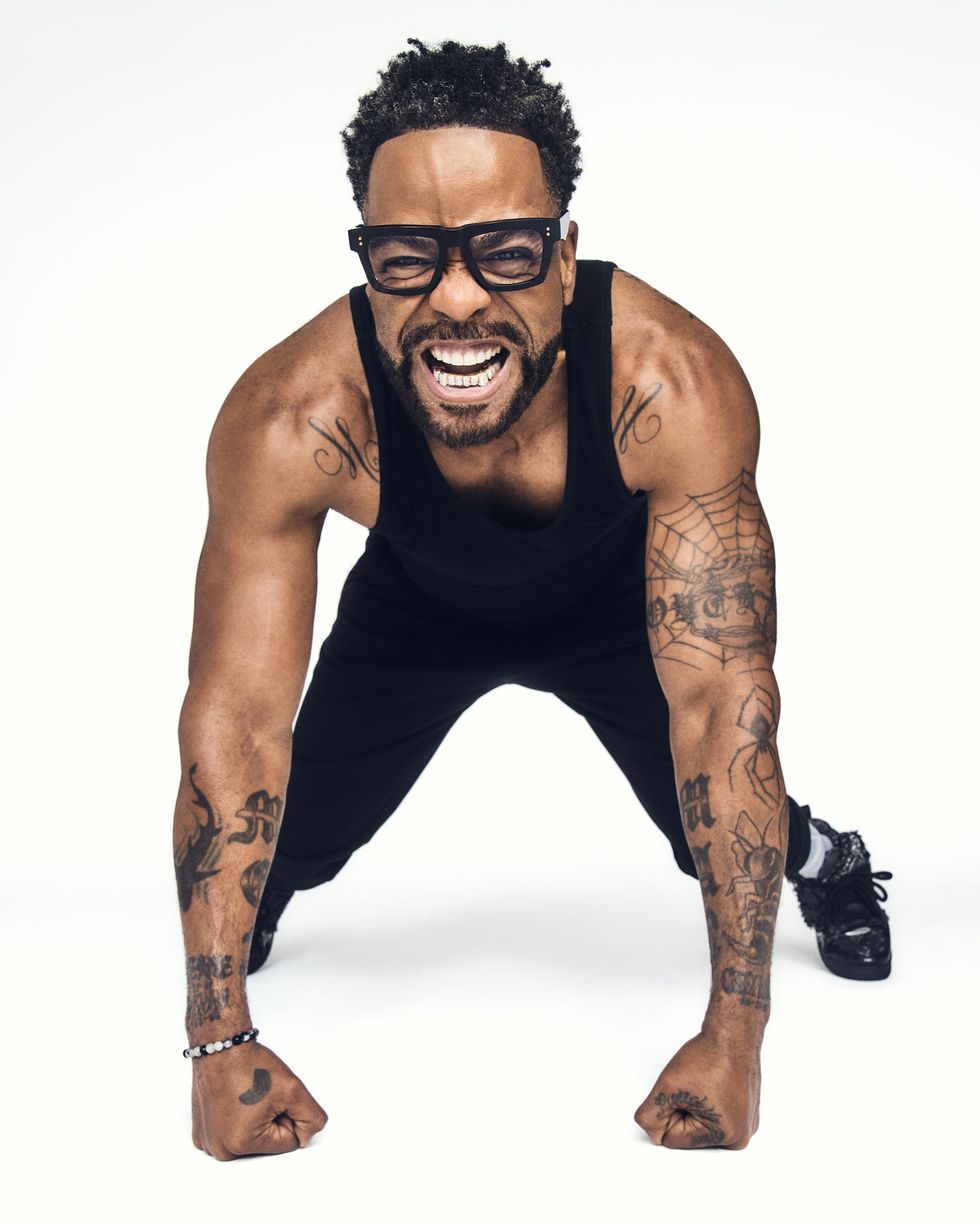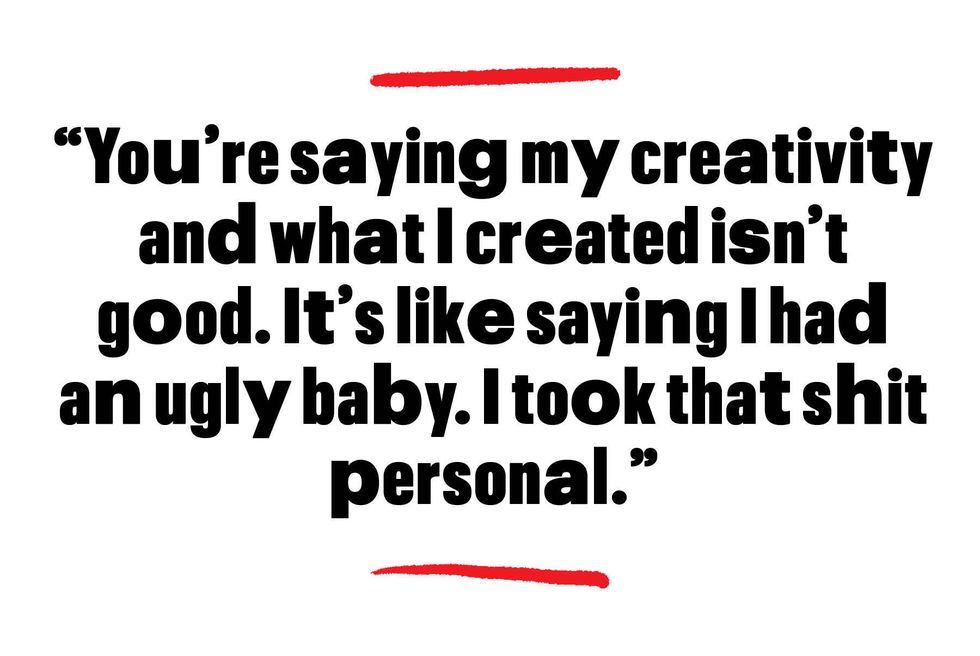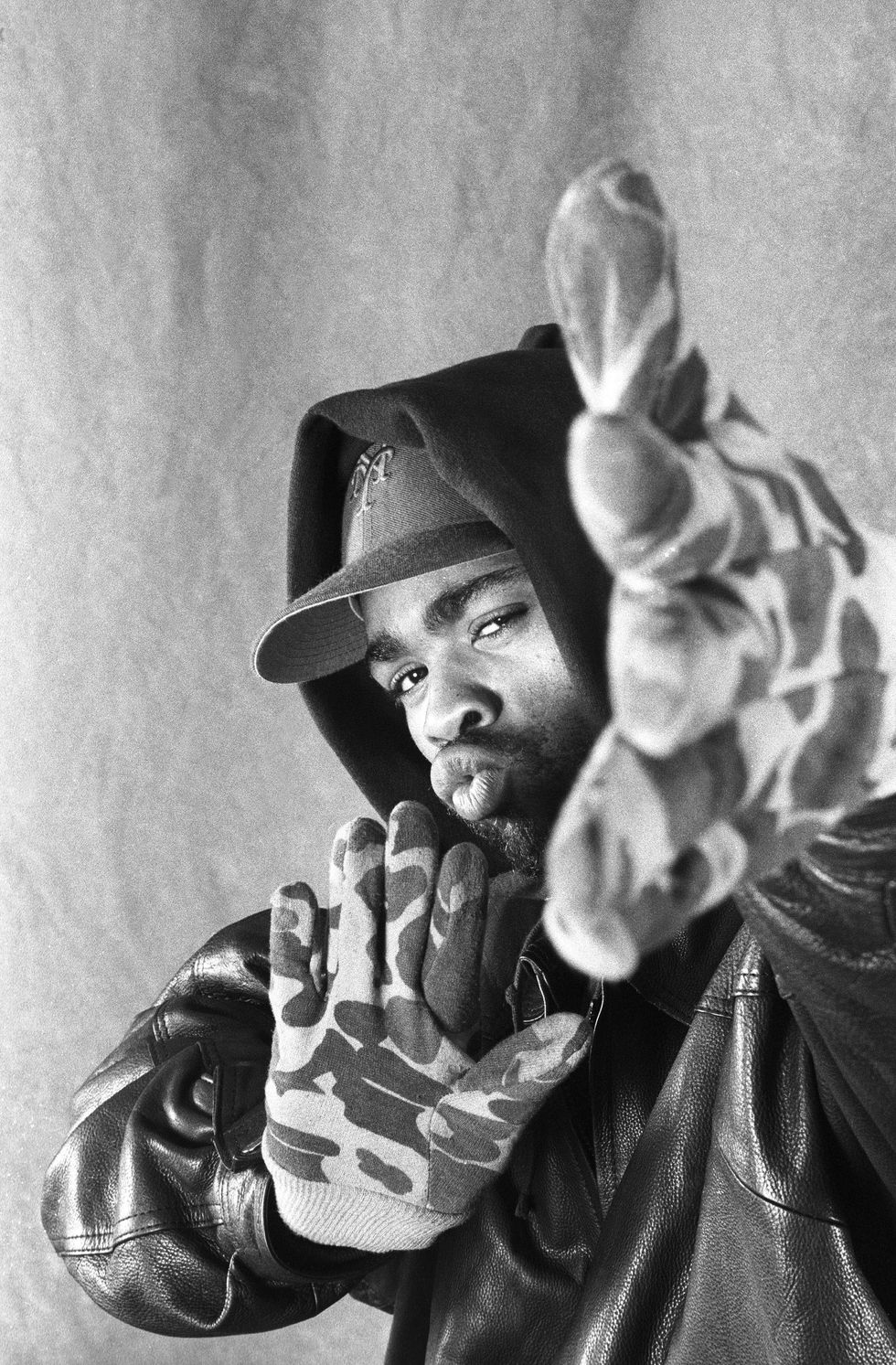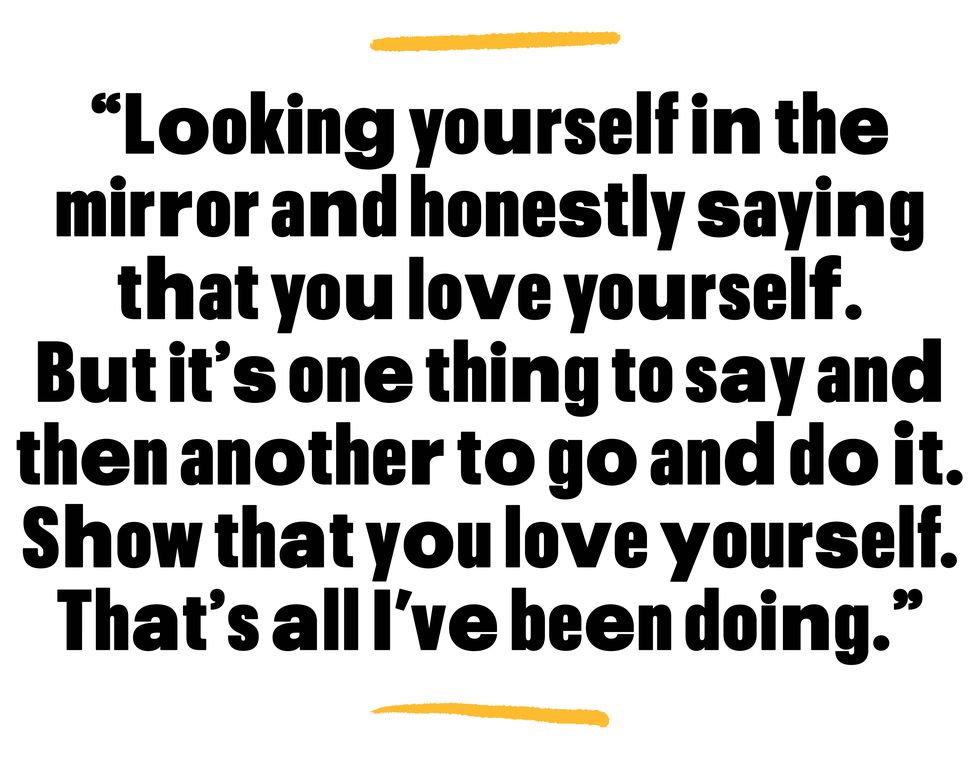This cover story is part of Hip-Hop Is Life, a series of profiles and features that revisit key moments in the intersection of hip-hop and Black men’s health over the last 50 years. Read the rest of the stories here.
WHEN METHOD MAN entered the rap game as a member of the Wu-Tang Clan in the early ’90s, his star power was undeniable. The bravado and lyricism on songs like his eponymous track on the Wu’s Enter the Wu-Tang (36 Chambers) and standout verses alongside Notorious B.I.G. and LL Cool J earned him street cred. Portraying the emotionally intelligent thug on his Mary J. Blige duet “I’ll Be There for You/You’re All I Need to Get By” catapulted him into sex-symbol status against his will. His record label propped him up as rap’s next superstar. He was on top of the world and under a lot of pressure no one could see. He didn’t recognize how much the adoration mattered to his mental health or how lacking it would lead to depression, anxiety, and substance abuse.
“It went from this childhood joy to this euphoric feeling of celebrity to feeling inadequate and not good enough,” he says, candidly. “And not even knowing that I’ve been depressed since I was a youngster. A lot of PTSD I had never dealt with before started resurfacing.”
During his prime, health was an afterthought. He says with stardom came being shuttled from place to place for album promos and performances, guzzling fast food along the way, with a youthfully fast metabolism shielding him from seeing any physical effects of his unhealthy lifestyle. His Wu-Tang brother Ghostface Killah was diagnosed with type 1 diabetes in 1996 when African Americans were more than twice as likely to contract the disease as white Americans. “Ghostface was the first guy that was really on this fitness shit. A lot of it had to do with his illness.”
Meth overcame his issues and went sober by paying better attention to his health. That included treating his 18-month battle with insomnia with late-night gym sessions that sometimes included 500-pound deadlifts and a combo of protein shakes and cannabis in the morning. That shift has earned him a steady acting career in Hollywood (“This is my life now,” he says. “I’m not selling records as Method Man anymore.”) and a consistently sharp pen as a rapper. He admires and respects hip-hop artists prioritizing their diets and exercising more these days, but he emphasizes it’s nothing new. The 52-year-old hip-hop legend has been around long enough to remember rappers in the ’80s and ’90s encouraging their listeners to care for their mental health and to value themselves. It was all part of a concerted effort by MCs to comprehensively and aggressively tackle the issues that plagued their communities until hip-hop changed course.
“There was a transition in hip-hop: They shut Public Enemy out; they shut KRS-One out. They shut out all these dudes: Jungle Brothers, Native Tongues. Black pride was shut out and traded for … hardcore hip-hop. Mindless thug music.”
As hip-hop has grown, so has Method Man. The man you see now is better than the one who lined your walls and bum-rushed in your ears from yesteryears. His secret? “Self-love: looking at yourself in the mirror and honestly saying that you love yourself,” he says. “What people see now is just happiness.”
The Wu-Tang Clan founding member celebrates the 50th anniversary of hip-hop by discussing the type of man he wants to be when life’s clock starts winding down.
Men’s Health: It has been about 30 years since Wu-Tang Clan’s debut album, Enter the Wu-Tang (36 Chambers). How much was health a priority for you back then compared to how it is now?
Method Man: It wasn’t at all, whatsoever. Wake up, smoke, hit the streets, regular shit, whatever the day called for that day. One thing they don’t do during your promo is give you time to do shit like activities for the gym or stuff like that. Nah, they shuttle you from one place to the next. You get fast food all day. But we were young, so metabolism helped and none of that stuff stuck.
How much do you talk about health with your Wu brothers?
They don’t wanna hear that shit! Those dudes don’t wanna hear that. [Laughs] Usually, when we get around each other, it is roasting sessions and shit like that. If anything, it’s referenced like the first five minutes when you walk into the room. “Oh, you look big, bro. What are you doing?” After that, it’s not even talked about anymore. That’s it. Ghostface was the first guy that was really on this fitness shit. A lot of it had to do with his illness. Divine, RZA’s brother, was always a fitness dude. That’s pretty much it, though. I think now, more than anything, guys are getting back in the gym, which is brilliant. I love that.
Do you think that hip-hop is opening up more along with the rest of the world in terms of having these conversations about taking care of their minds and bodies?
You know what? I disagree. As far as the physical, maybe. But as far as the mind, there was a transition in hip-hop: They shut Public Enemy out; they shut KRS-One out. They shut out all these dudes: Jungle Brothers, Native Tongues. Just the Black power, Black pride was shut out and traded for—and I don’t even like to put a label on it, just hardcore hip-hop, period. It was mindless thug music. It’s not gangsta rap, because what the masses or the media dubbed gangsta rap is just these dudes doing their hardcore hip-hop on the West Coast. And they were in gangs, so that’s gang rap. But it got a bad rap all around. That was a problem because we were always training our minds. Wu-Tang came into the game talking about we’re gods. The Black man is god. At the time, no one had ever heard Black men talk to each other this way. “No, Lord, you’re the master of civilization, the god of the universe.” Instead of “What’s up, my nigga?” it’s “What’s happening, god? Peace, god. What’s up, Lord? I love you, King.” Things of that nature. And we addressed ourselves as that. Everybody loves some knucklehead music, but there was a balance back in the day. That balance was lost, I guess.
You had an interview with Rolling Stone from 1998 where you said it seemed like if you weren’t rapping about a certain thing, it was like fans were telling you that your life wasn’t good enough. Did you tie a lot of your identity to your music back then?
I’m just saying my inner thoughts, my creativity. You’re saying my creativity and what I created aren’t good. It’s like saying I had an ugly baby. [Laughs] I took that shit personally. That’s just me wearing my heart on my sleeve. Some things you do take personally, especially when it comes to your creations. It’s like telling Kanye [West] he’s not a genius; he’s gonna argue with you to the end of time. “I am a genius! I have proof I’m a genius!” I just view it the same way. I can give you the best analogy I can give you.
There’s a guy that’s always on the TV when they do the NFL drafts. I won’t say his name, but it’s a white dude. He’s always over-optimized about who a team should take and why they’re not winning. He never played football and never coached. He’s never even sat on the bench of a football team. And yet he thinks we’re supposed to value his opinion. This is how artists feel about their shit. If you’ve never written a rhyme before, don’t come here telling me my shit’s not good enough. If you’ve never had to shoot at a family member because they violated your mother, don’t ever come to tell me anything. In that vein, right there. That’s pretty much it. How dare you say I’m not good enough? Isn’t my life good enough?
You’ve recently opened up about your battles with anxiety and depression around the height of your career in the late ’90s/early 2000s. It seemed like you were on top of the world, but you were dealing with real issues.
I was just being irresponsible, with many things coming back to bite me all at once. I wasn’t taking care of my finances in a proper fashion. The admiration wasn’t the same. I didn’t think it would bother me that much, but it did—people’s opinions. I was just angry. It went from this childhood joy to this euphoric feeling of celebrity to feeling inadequate and not good enough. That’s where the depression and stuff came in. I didn’t even know I had been depressed since I was a youngster before I started doing music and moved to Staten Island. A lot of PTSD I had never dealt with before started resurfacing, but I didn’t know what it was then. In hindsight, you delve deeper into your psyche and see where certain things come from. I just wasn’t a happy person. It reached a point where misery was loving company, and the people around me were just as miserable. So, it kind of fits. Then I got tired of it and did not want to be around miserable people anymore. I just wanted to see light. I wanted everything light. Forget the darkness. What can I create for myself? It had nothing to do with finances. It had nothing to do with other people. It was just me. What can I control? That’s what I did; I took control after that. I stopped valuing other people’s opinions, and instead of being my biggest critic, I became my biggest fan.
What is the process of becoming your biggest fan instead of becoming your biggest critic?
Self-love; it’s simple as that. Looking yourself in the mirror and honestly saying that you love yourself. But it’s one thing to say and then another to go and do it. Show that you love yourself. That’s all I’ve been doing. What people see now is just happiness.
I saw that you had begun to get into your health journey due to trying to fight insomnia. How bad was the insomnia, and what made you take that step forward?
My insomnia was pretty bad. I’m talking a year and a half, maybe, not having great sleeping habits. Trying to find stuff to do in the middle of the night is crazy, especially when you have all this stuff within your reach. PlayStations, books, and all that stuff, and none of that is satisfying anymore. You just find yourself up with all this energy. I didn’t know what to do with myself. So after the eighth game of Call of Duty, I said, “Let me see if the gym is open. I need to find something. I need to break this cycle, break this pattern.” It was about 3:30 in the morning, and I looked to see what time the gym opened. I told myself, if this thing opens at 7:00, I’m not going. It opened at 4:00. I hopped my ass up. I threw on my shit. And I felt like this whole new energy. I didn’t know what to expect going in there, but I had been working with a trainer prior to that, so I said, “I’ll just go in there and follow this routine.” And that’s how it started.
What would you say a morning routine was like when you came into the game versus your morning routine now?
There weren’t any mornings when I came into the game. [Laughs] You’re asking what my afternoons were like? But now my mornings, I mean, it’s typical. Some people like coffee when they take a shit. I smoke a blunt when I take a shit; I don’t like coffee. After you take a shit, what do you do? You turn on the radio, and crank that shower up. This is every day for me. Same shit, too. Depending on what the song is, I may do a few dance moves, but I’m about my business in that shower, wash my shit up. When I come out, my blunt is usually waiting for me. I light that motherfucker back up while I brush my teeth. And you have to brush each side. There are eight different spots, 30 seconds each. Once I come out of there and finish my blunt, I make my little protein shake, and then I get ready for the gym. That’s what the morning is for me.
If it’s a work morning, I wake up that morning, especially if I’m going to do Power, I smoke two blunts and take a poop. [Laughs] I just feel so clear for some reason. It’s almost as if the character I’m playing kind of jumps into my body, and I’m him for that day. So I’m super clear. My lines are just going off in my head all fucking day until I get to set. Those are the boring mornings. I let off tweets from the toilet, baby! Tweets from the toilet!
You’ve spoken before about how early in your career, you were sort of resistant to the idea of being a sex symbol. Did you get more comfortable with the idea of being a sex symbol?
I’m not a sex symbol. That’s the whole fucking point, man. Put the words together. Sex and symbol. What’s the symbol? I’m not doing anything. So what’s the symbol?
I told three female friends that I was interviewing you, and they all had the same reaction: “Oh my god. Tell Meth I said hello. Oh my God, I love Meth.” That’s been a consistent thing with you.
I’m not going to lie, I love every freaking minute of it, but I don’t want to be that guy that, when the clock starts winding down, he’s still trying to be that sexy. I mean, Smokey Robinson is always going to be sexy to somebody. I’m not using him as an example; I’m just saying that with where Smokey is right now if Smokey was still at the same time he was back then, it would look ridiculous. And Smokey knew he was a sexy motherfucker. You get to a certain age where you just stop caring, and I think that’s the sexiest thing in the world right there.
A version of this story appeared in the September 2023 issue of Men’s Health.
All shoots and interviews for this cover were conducted prior the SAG-AFTRA strike.

Freelance Writer
William E. Ketchum III is a journalist who is based in New York City and dedicated to covering the intersection of music, culture, and society. His work has appeared in Vulture, Entertainment Weekly, GQ, and more.








Comments are closed.